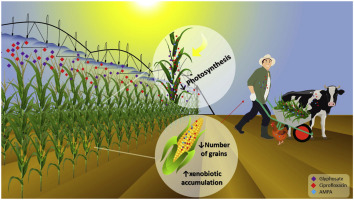Ecotoxicology and Environmental Safety ( IF 6.8 ) Pub Date : 2020-04-03 , DOI: 10.1016/j.ecoenv.2020.110549 Marcelo Pedrosa Gomes 1 , Daiane Cristina Rocha 1 , Júlio César Moreira de Brito 2 , Davi Santos Tavares 1 , Raizza Zorman Marques 1 , Patrícia Soffiatti 3 , Bruno Francisco Sant'Anna-Santos 3

|
Chemicals used to assure agricultural production and the feasibility of planting sites often end up in bodies of water used for crop irrigation. In a pot study, we investigated the consequences associated with the irrigation of maize with water contaminated by ciprofloxacin (Cipro; 0, 0.2, 0.8, 1.4 and 2.0 μg l−1) and/or glyphosate (0, 5, 25 and 50 mg l−1) on yields and food safety. Glyphosate in concentrations ≥25 mg l−1 prevented plant establishment, regardless of Cipro presence. Evaluations made at the V5 stage of plants reveal that Cipro concentrations ≥0.8 μg l−1 and glyphosate decreased photosynthesis and induced changes in leaf anatomy and stem biophysical properties that may contribute to decreased kernel yields. When those chemicals were applied together, kernel yield reductions were accentuated, evidencing their interactive effects. Irrigation with contaminated water resulted in accumulations of Cipro and glyphosate (as well as its metabolite, aminomethylphosphonic acid) in plant tissues. Accumulation of these chemicals in plant tissues such as leaves and kernels is a problem, since they are used to feed animals and humans. Moreover, these chemicals are of potential toxicological concern, principally due to residue accumulations in the food chain. Specially, the antibiotic residue accumulations in maize tissues can assist the induction of antibiotic resistance in dangerous bacteria. Therefore, we point out the urgency of monitoring the quality of water used for crop irrigation to avoid economic and food-quality losses.
中文翻译:

玉米灌溉用水中的新兴污染物:与环丙沙星和草甘膦有关的经济和食品安全损失。
用于确保农业生产的化学药品和种植地点的可行性通常最终会出现在用于作物灌溉的水域中。在盆栽研究中,我们调查了用环丙沙星(Cipro; 0、0.2、0.8、1.4和2.0μgl -1)和/或草甘膦(0、5、25和50 mg污染的水)灌溉玉米的后果l -1)关于产量和食品安全性。不论Cipro的存在如何,浓度≥25mg l -1的草甘膦都会阻止植物的建立。在植物的V5阶段进行的评估表明,Cipro浓度≥0.8μgl -1草甘膦会降低光合作用,并导致叶片解剖结构和茎生物物理特性发生变化,从而可能导致籽粒产量下降。当这些化学药品一起使用时,籽粒产量的降低就更加明显,证明了它们的相互作用。用污染的水灌溉导致植物组织中Cipro和草甘膦(及其代谢产物氨甲基膦酸)积累。这些化学物质在植物组织(如叶子和果仁)中的积累是一个问题,因为它们被用来喂养动物和人类。此外,这些化学物质具有潜在的毒理学意义,主要是由于食物链中的残留物积累。特别是,玉米组织中残留的抗生素残留物可以帮助诱导危险细菌产生抗生素抗性。因此,


























 京公网安备 11010802027423号
京公网安备 11010802027423号